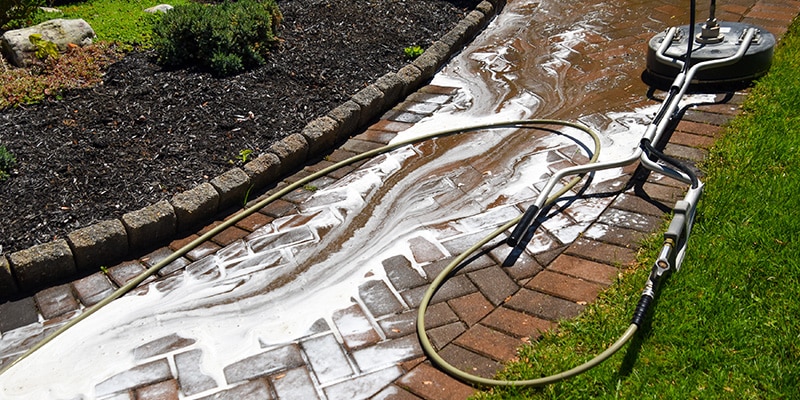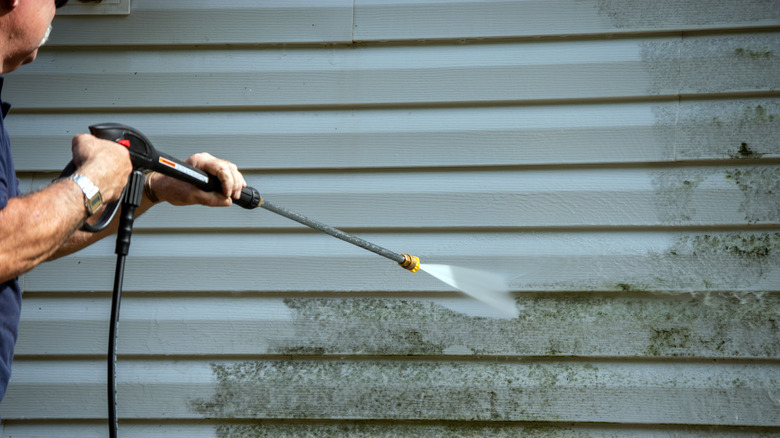The Ecological Benefits of Pressure Washing: A Cleanser Home and Earth
Pressure cleaning is even more than just a reliable cleaning method; it personifies a dedication to ecological stewardship. By utilizing high-pressure water, this strategy minimizes the reliance on rough chemicals, therefore lowering soil and water contamination. Beyond water preservation, pressure cleaning additionally plays a pivotal function in improving air quality by getting rid of allergens and toxins.
Lowers Chemical Usage
Minimizing chemical use is just one of the substantial ecological benefits of pressure cleaning. Standard cleaning techniques usually depend heavily on severe chemicals to efficiently get rid of dirt, crud, and discolorations from numerous surface areas. These chemicals can be damaging to the environment, contaminating soil and water sources, and posturing threats to both human health and wellness and wildlife. Pressure cleaning, on the various other hand, uses the power of highly pressurized water to accomplish the same, otherwise far better, cleaning up outcomes without the need for these unsafe materials.
Pressure cleaning makes sure that surfaces are not just superficially tidy but deeply sterilized, preventing the requirement for duplicated chemical applications over time. By embracing pressure cleaning, companies and home owners can add to a cleaner setting, minimize their eco-friendly impact, and promote a much healthier ecosystem.
Saves Water

A regular garden pipe, as an example, can use up to 10 gallons of water per min, whereas pressure washing machines balance around 2-5 gallons per minute. This stark difference highlights the water preservation capacity of pressure washing, making it a much more lasting option for companies and property owners alike. By using pressurized streams, these tools make sure that every drop of water is utilized efficiently, reducing overall consumption and reducing waste.
In addition, the performance of pressure cleaning translates to quicker cleansing times, which even more contributes to water conservation. Embracing pressure cleaning not only advertises cleaner surfaces yet additionally sustains broader ecological sustainability by saving one of our earth's priceless sources.
Improves Air Quality
Pressure cleaning not just preserves water but also significantly boosts air quality, offering another vital ecological advantage. The process properly eliminates accumulated toxins, such as mildew, pollen, and mold and mildew, from outside surface areas. These impurities can become airborne, contributing to poor air quality and intensifying respiratory problems like asthma and allergies. By eliminating these contaminants, pressure cleaning straight reduces the quantity of hazardous particles launched into the atmosphere.
Moreover, pressure cleaning can aid mitigate the spread of spores and germs that grow in damp, unclean atmospheres - kansas city pressure washing. When surfaces are completely cleansed, the possibility of these bacteria ending up being airborne is decreased, causing a much healthier living environment. This is specifically essential in city locations where air quality is typically compromised by higher degrees of air pollution
Additionally, pressure washing eliminates gunk and dirt that can nurture unstable organic substances (VOCs) VOCs are chemicals that go to website evaporate at area temperature level and can create significant health and wellness problems, consisting of migraines and respiratory system issues. By properly cleansing surface areas, pressure washing minimizes the presence of these unsafe compounds, adding to a cleaner and more secure ambience. Hence, pressure washing plays an important role in improving air quality and advertising total ecological health and wellness.

Avoids Surface Damage
The conservation of structural stability stands as a crucial ecological advantage of pressure cleaning. Routine pressure cleaning efficiently removes these hazardous materials, thus protecting against surface damages and reducing the demand for frequent repair services or replacements.
Along with biological pollutants, contaminants like oil, grime, and oil can likewise choose surface areas, particularly in metropolitan and industrial atmospheres. These pollutants can create staining and deteriorate the architectural elements over time. Pressure cleaning gets rid of these residues, ensuring that the surface areas stay undamaged and durable. By alleviating surface damages, pressure washing assists in preserving the original strength and look of various products, hence contributing to an extra sustainable and environmentally-friendly living environment. This proactive method to upkeep not just sustains the long life of frameworks yet also reduces the waste produced from premature substitutes.
Enhances Building Longevity
A key advantage of pressure washing is its capability to substantially boost property longevity. Routine pressure cleaning gets rid of harmful compounds such as mold, mold, algae, and dust that collect on surfaces gradually. These contaminants can create severe destruction to building products, causing early aging and the need for expensive repairs or substitutes. By removing these agents, pressure washing helps to protect the structural stability and visual appeal of homes and industrial buildings.
Moreover, the elimination of harsh components like salt and pollutants from surface areas such as concrete, timber, and steel can stop the beginning of rust and decay. This positive maintenance method guarantees that materials like home siding, decks, and driveways continue to be in optimal problem for a longer period. Consequently, homeowner can prevent constant maintenance cycles and the environmental effect connected with the manufacturing and disposal of building and construction materials.
Additionally, pressure washing can also extend the life of paint and coverings. By maintaining surfaces clean, it decreases the need for regular repainting, thus saving resources and minimizing chemical drainage right into the environment. Generally, pressure washing is a sustainable technique that contributes to both residential property longevity and environmental preservation.
Final Thought
In recap, pressure washing offers substantial environmental advantages by decreasing the dependence on harsh chemicals, preserving water, boosting air quality, and protecting against surface damages. This approach not only expands the longevity of products however likewise supports lasting techniques and adds to a much healthier environment. By taking on pressure washing, a cleaner home and world can be achieved, thus advertising both ecological stewardship and the health of surrounding communities.
In enhancement to lessening chemical More Help usage, pressure washing also preserves water, underscoring its ecological benefits. Embracing pressure washing not just advertises cleaner surfaces however likewise sustains wider ecological sustainability by saving one of our earth's precious resources.Pressure cleaning not just conserves water redirected here but likewise considerably improves air quality, providing one more essential ecological benefit. By efficiently cleaning up surface areas, pressure cleaning minimizes the existence of these damaging compounds, adding to a cleaner and much safer atmosphere.In recap, pressure cleaning offers considerable ecological advantages by minimizing the dependence on rough chemicals, preserving water, boosting air high quality, and protecting against surface damage.